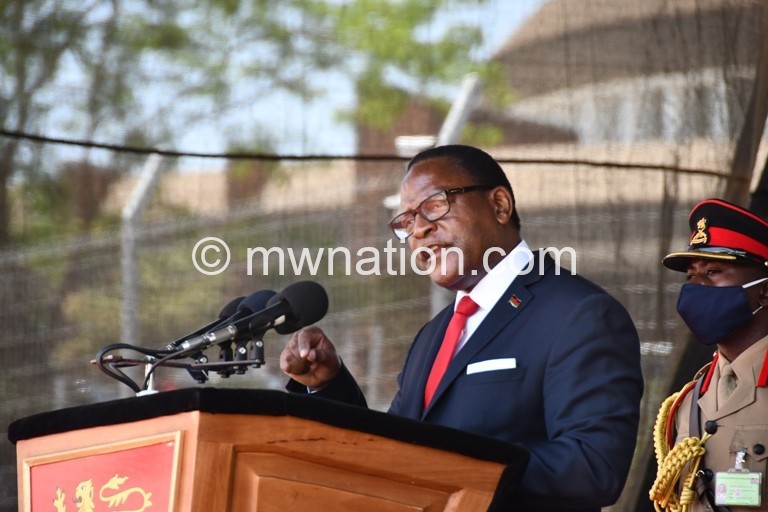Chakwera in quest to build bilateral relations
President Lazarus Chakwera started his term of office trying to cement strong bilateral relations with several countries by holding talks with them on various issues.
The first country he visited since winning the court-ordered fresh presidential election on June 23 was Zambia in September, where he held discussions with that country’s President Edgar Lungu, including on issues of land encroachment between the two countries.
The discussions followed a boundary re-affirmation exercise between the two countries which showed that there is encroachment between the two countries, with Malawi’s public infrastructure such as schools, farm land and part of the M1 being in Zambia’s territory while some of Zambia’s infrastructure is also domiciled in Malawi.
Speaking at Kamuzu International Airport (KIA) in Lilongwe on arrival from Zambia, Chakwera said cases of encroachment between Malawi and Zambia should not be a cause for concern for the two countries as people of the two countries are one despite the colonial boundary that separates them.

Said the President: “People can choose to live where they are living without minding the boundary. After all, they are brothers and sisters and have lived together even before the boundary was demarcated several years ago.”
Last year, the Department of Surveys under the Ministry of Lands issued a report of the boundary re-affirmation exercise Malawi and Zambia undertook for eight years, which established that the two countries encroached on each other’s land.
The report suggested a number of solutions, including an agreement between the two countries to allow people continue living as they are now or re-demarcate the boundary.
Malawi has similar challenges with Mozambique, according to the report. With Tanzania, the report states, the re-affirmation exercise has stalled due to the unresolved Lake Malawi dispute.
However, Chakwera did not outline details of his discussion with Lungu on the boundary issue.
Towards the end of September, Chakwera departed for Zimbabwe on a two-day State visit where he held talks with President Emmerson Mnangagwa, whose regime is under international scrutiny for human rights abuses.
Following the trip, two civil society organisations (CSOs)—Youth and Society (YAS) and Centre for Human Rights and Rehabilitation (CHRR)—wrote Chakwera asking him to take advantage of the trip and discuss with his Zimbabwean counterpart the need for his regime to stop attacking human rights defenders and respect human rights.
Chakwera said this was one of the issues to be discussed. However, he could not divulge more details, only adding that Malawi and Zimbabwe have enjoyed long bilateral relations and it was in the same spirit that he had to visit the country.
But upon his return from the Zimbabwe trip, Chakwera said part of his discussions with Mnangagwa was on human rights and regional integration.
Early October, Chakwera went to Mozambique for a day-long State visit, where on arrival from the neighbouring country, he said the ongoing insurgencies in some parts of Mozambique pose a threat to Malawi as a country and the Southern Africa Development Community (Sadc).
The President also told the press at KIA that one of the issues he discussed with his Mozambican counterpart Fellipe Nyusi was the ongoing conflict in some parts of the country.
According to the United Nations, since the outbreak of the insurgency in northern Mozambique in 2017, militant attacks on civilians and government security forces have killed over 1 000 people and displaced over 200 000.
In 2014, a number of Mozambican citizens, due to conflict in Tete Province, had moved to Kapise in Malawi where a temporary camp was created. Later, they were moved to Luwani in Neno District in 2016.
Chakwera’s fourth country to visit was Tanzania, where President John Pombe Magufuli gave Chakwera and his entourage a warm welcome.
Magufuli, in a speech at the country’s State House, described the meeting of Malawian and Tanzanian leaders as a “special opportunity God has given us”.
The Tanzanian leader said African leaders should move and plan together, including in effective economic development, for the good of their people.
However, there was controversy when, during the two-day State visit, Chakwera conducted business without wearing a mask.
But on arrival, Chakwera defended his conduct, saying it was a question of balancing Malawi’s tradition and diplomacy. Tanzanians do not wear face masks because they believe the Covid-19 pandemic is over.
The President’s final external trip for the year 2020 was in November. He went to South Africa where he together with President Cyril Ramaphosa, recommitted to the existing memorandum of understanding on economic trade to boost trade and economic integration between the two countries.
However, Chakwera’s departure from South Africa was delayed for up to seven hours due to security reasons.
Presidential press secretary Brian Banda later said Chakwera’s advance delegation was initially refused to travel back with the President, with South Africa citing unspecified security concerns.
He said the President was advised to leave from Waterkloof Airforce Base without his delegation but Chakwera was dissatisfied with the vague explanation and refused to leave his team behind.
The delegation complied with the amended security concerns and Chakwera finally left South Africa six hours behind schedule.
It later emerged that fugitives Prophet Shepherd Bushiri and his wife Mary had escaped South Africa the same week, sparking rumours that they had fled with the assistance of Chakwera’s staff—a rumour both governments later refuted.
Meanwhile, the South African Government in December formally requested Malawi to extradite the Bushiris to South Africa to stand trial for fraud charges levelled against them.





